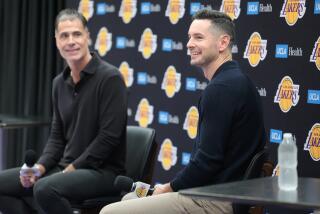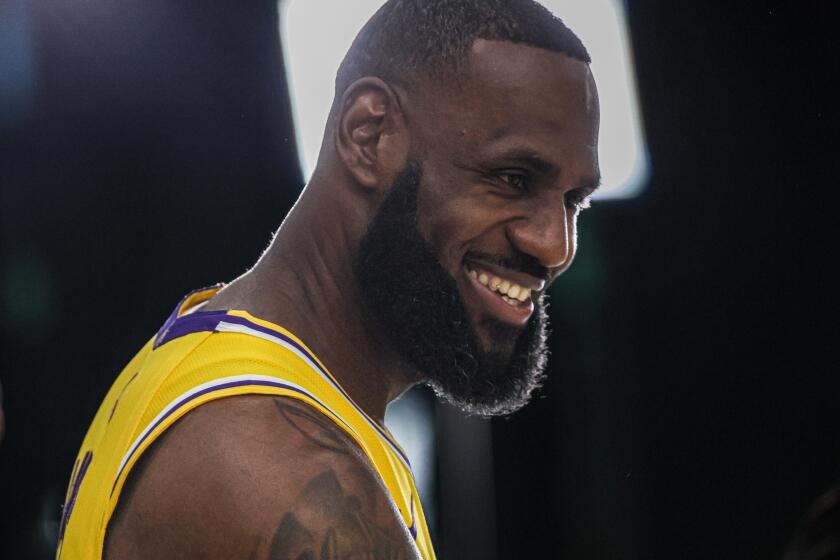What should the Lakers do with Ramon Sessions? (Poll)
Within a three-month span, the Lakers went from having a bloated backcourt to one without a definitive starter at point guard.
The Lakers upgraded their point guard position before the trade deadline by acquiring Ramon Sessions. Then they felt it was no longer necessary to keep Derek Fisher. Despite Sessions’ instantly bolstering the Lakers’ speed and pick-and-roll sets, however, he hardly provided the same clutch play in the playoffs that epitomized Fisher’s value. And with Sessions declining his $4.55-million option last week to become a free agent, the Lakers are left wondering whether to try to settle with a far-from-developed player or start all over again in bolstering their backcourt.
There aren’t easy answers, leaving the braintrust of owner Jerry Buss, General Manager Mitch Kupchak and executive Jim Buss with plenty of variables to consider.
Why the Lakers should keep Sessions:Just because he opted out of his contract doesn’t suggest Sessions wants to leave the Lakers. He’s stated multiple times he wants to stay with the team, but acknowledged the hope for long-term security. Because of that framework, it’s unlikely Sessions will pursue other options just to fatten his wallet. Instead, he will pursue other options in hopes it will spur the Lakers into showing more of a long-term commitment in his future.
The Lakers have plenty of reasons to believe Sessions is worth the investment.
There’s his potential.
Sessions’ speed and playmaking abilities immediately improved how the Lakers ran their offense. According to Synergy Sports Technology, the Lakers generated only 10.9% of their offense through pick and rolls before Sessions’ arrival. After that, Sessions ran the offense through pick and rolls on 41.8% of his possessions. Before Sessions joined the team, fastbreak points represented only 9% of the Lakers’ offense. When Sessions played, 16% of his points came in transition. These aforementioned areas made it easier for the Lakers’ “Big Three” of Kobe Bryant, Andrew Bynum and Pau Gasol to receive open looks.
There may have been a stark statistical difference between Sessions’ performances in the regular season (12.7 points per game, 47.9% shooting, 6.2 assists) and playoffs (9.7 points, 37.7% shooting, 3.6 assists). Yet, that inconsistency reflected some areas that would likely improve next season. Sessions lacked any previous playoff experience. The Lakers also struggled to find the right balance and benefit from Sessions’ speed, while also ensuring they played at a methodical pace.
There is also the lack of options.
Should Sessions walk, the Lakers could have only one point guard under contract. Backup Steve Blake remains on the books for two years and $8 million, while rookie Darius Morris may sign with another team in hopes of having more playing time.
New Jersey Nets point guard Deron Williamsremains an attractive choice should he decline his player option, but he acknowledged recently to The Times how unlikely it is that he would sign with the Lakers. On a lesser scale, acquiring Kirk Hinrich could also present financial challenges. Some free-agent possibilities aren’t definitive upgrades (Raymond Felton). Some potential safe routes hardly provide a long-term investment because of age and financial costs. (Steve Nash, Jason Kidd).
Because of that, the Lakers may as well go with what they have. It sure beats the alternative.
Why the Lakers should let Sessions walk:The Lakers can’t afford to devote a significant amount of resources toward securing Sessions. Since the Lakers are far over the NBA luxury tax threshold, their main free-agency tool involves the “mini” mid-level exception worth $3 million. The Times’ Mike Bresnahan reported the Lakers can offer Sessions more than the mini mid-level because they own his “Bird rights,” which gives the Lakers more leeway than other teams in length of contracts and annual raises. Still, the Lakers are well aware of the need to limit spending so they minimize the harsher luxury tax penalties starting after next season.
Sessions’ poor postseason may actually undermine his hope of fielding lucrative offers, essentially leaving the Lakers with him almost by default. But that’s not necessarily a good thing. Even if another year of experience helps him fit better in the lineup, Sessions showed signs he may remain no better than a solid backup point guard. Blake often replaced him in late-game situations in the playoffs. Despite constant insistence from the coaching staff and teammates, Sessions appeared too uncomfortable looking for his own shot and setting up teammates.
That’s why it’s imperative the Lakers look to make trades involving Andrew Bynum or Pau Gasol for Williams or Kyle Lowry. Acquiring either player would severely diminish the need for the Lakers to worry at all about keeping Sessions.
Verdict: This all rests on Sessions’ value in the open market. Should he land some lucrative and long-term offers, the Lakers aren’t going to exhaust their funds to keep him. Should he only meet lukewarm interest, the Lakers don’t have to sweat too much in ensuring he stays. Because potential suitors may be less impressed and/or interested after Sessions’ playoff disappointment, the latter scenario is more likely.
You’ve read my take. Now what’s yours? Vote in the poll below and explain further in the comments section below.
RELATED:Ramon Sessions will not exercise option to stay with Lakers
Deron Williams suggests Lakers could acquire him only via trade
Lakers report card: Ramon Sessions soars and stumbles
E-mail the Lakers blog at mgmedin@gmail.com. Follow the Lakers blog on Twitter.
More to Read
All things Lakers, all the time.
Get all the Lakers news you need in Dan Woike's weekly newsletter.
You may occasionally receive promotional content from the Los Angeles Times.







